
"It Happened in Sun Valley" is a 1941 song composed by Harry Warren, with lyrics by Mack Gordon. It was recorded and featured by Glenn Miller and his orchestra in the movie Sun Valley Serenade.

John Chalmers MacGregor, better known as Chummy MacGregor, a musician and composer, was the pianist in The Glenn Miller Orchestra from 1936 to 1942. He composed the songs "Moon Dreams", "It Must Be Jelly ", "I Sustain the Wings", "Doin' the Jive", "Sold American", "Cutesie Pie" in 1932 with Bing Crosby and Red Standex, and "Slumber Song".

"Moonlight Serenade" is an American swing ballad composed by Glenn Miller with subsequent lyrics by Mitchell Parish. It was an immediate phenomenon when released in May 1939 as an instrumental arrangement, though it had been adopted and performed as Miller's signature tune as early as 1938, even before it had been given the name "Moonlight Serenade". In 1991, Miller's recording of "Moonlight Serenade" was inducted into the Grammy Hall of Fame.
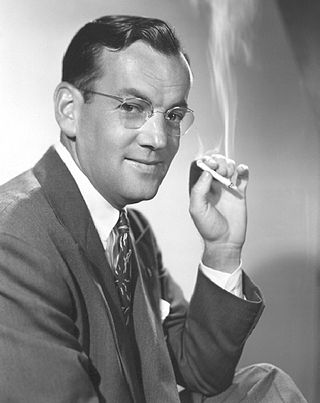
Between 1938 and 1944, Glenn Miller and His Orchestra released 266 singles on the monaural ten-inch shellac 78 rpm format. Their studio output comprised a variety of musical styles inside of the Swing genre, including ballads, band chants, dance instrumentals, novelty tracks, songs adapted from motion pictures, and, as the Second World War approached, patriotic music.
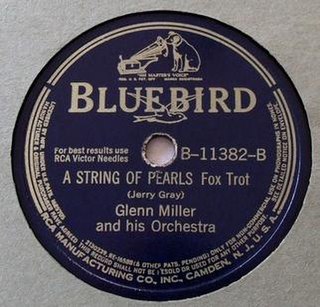
"A String of Pearls" is a 1941 song recorded by Glenn Miller and His Orchestra on RCA Bluebird that November, becoming a #1 hit. It was composed by Jerry Gray with lyrics by Eddie DeLange. The song is a big band and jazz standard.

Solo Hop is a 1935 instrumental composed by Glenn Miller and released as a Columbia 78 single. The recording was part of Glenn Miller's earliest sessions as a leader recording under his own name.

"Doin' the Jive" is a 1938 song composed by Glenn Miller and pianist Chummy MacGregor. The song was released as a 78 single by Glenn Miller and His Orchestra on Brunswick.
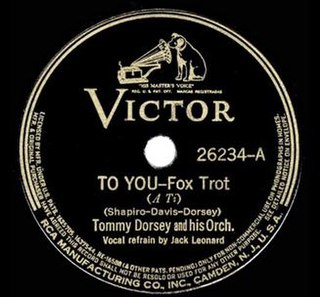
"To You" is a 1939 song composed by Tommy Dorsey with Benny Davis and Ted Shapiro. The song was a top 10 hit on the Billboard charts.

"I Swung the Election" is a 1939 song composed by Glenn Miller and recorded by jazz trombonist Jack Teagarden and his orchestra. Jack Teagarden released the song as a Columbia 78 single in 1939 and as a V-Disc in 1948.

Community Swing is a swing jazz instrumental composed and recorded by Glenn Miller and released as a Brunswick 78 single in 1937 by Glenn Miller and His Orchestra.

Sometime is a 1939 song composed by Glenn Miller, Chummy MacGregor, and Mitchell Parish and performed for radio broadcast only. The song was never recorded in the studio but was performed live for remote radio broadcast on the Mutual and Blue Network from the Meadowbrook Ballroom in Cedar Grove, New Jersey.

"7-0-5" or "Seven-O-Five" or "705" is an instrumental composed by Glenn Miller in 1943. The instrumental was performed by the Army Air Force Orchestra under the leadership of Capt. Glenn Miller in 1943-1944 and in 1945 under Sgt. Jerry Gray.
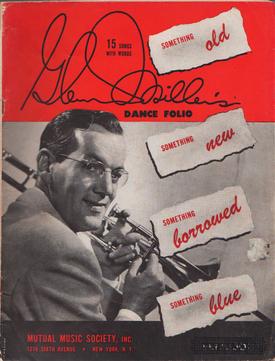
"I Sustain the Wings" is a 1943 big band and jazz instrumental co-written by Glenn Miller. The instrumental was the theme for the eponymous radio program broadcast on CBS and NBC from 1943 to 1945.
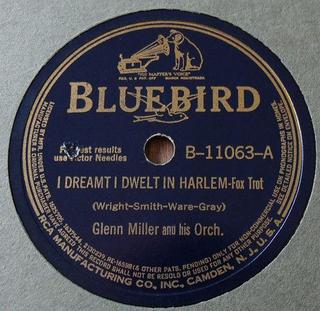
"I Dreamt I Dwelt in Harlem" is a 1941 jazz and pop song recorded by Glenn Miller and His Orchestra. The song was released as a 78 single on RCA Bluebird by Glenn Miller.

"It Must Be Jelly ('Cause Jam Don't Shake Like That)" is a 1942 jazz and pop song recorded by Glenn Miller and His Orchestra. The song was released as an RCA 78 single by Glenn Miller in 1944. Woody Herman also released the song as a single and as a V-Disc.

"Introduction to a Waltz" is a 1941 swing jazz instrumental by Glenn Miller. The instrumental was featured on two radio broadcasts of the Chesterfield program and was released as a 45 EP single.

"Pennsylvania 6-5000" is a 1940 swing jazz and pop standard recorded by Glenn Miller and His Orchestra as a Bluebird 78 rpm single. The music was by Jerry Gray and the lyrics by Carl Sigman.

"I Know Why " is a 1941 song by Glenn Miller and His Orchestra. The song appeared in the 20th Century Fox movie Sun Valley Serenade. The song was also released as an RCA Bluebird 78 single.

"Crosstown" is a 1940 song recorded by Glenn Miller and His Orchestra. The song was written by James Cavanaugh, John Redmond, and Nat Simon.



















